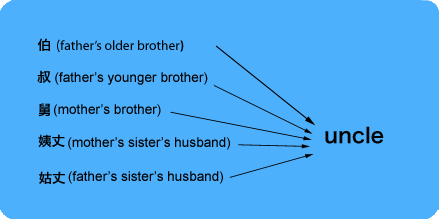|
|
|
|
The Method : Step 1 - Observe
Lesson 4.2 : terms
For example in one culture, the word brother could have very different meaning than in another. That is true in today's world as well. In one region the word 'supper' means the evening meal, while in another it means 'a light meal served late in the evening'.1 The word 'napkin' is another example. I'll let you find out yourself what the different meanings are!
And then in one language there can be many words that would translate to the same word in another. For example, there are at least five Chinese words/terms that would be translated as 'uncle' in English. + -

Since the English Bible is translated from the original language (Hebrew, Greek, or Aramaic), one word could be translated a number of different ways; and a few different words could be translated to the same English word. + -
Then there are words in the Bible that we might not be familiar with, so it's good to look them up so that we can determine what it means in the context. Sometimes it's just interesting and we can gain some insights. The word 'baptize' is one and you might have heard cited by speakers or pastors. Take a look (especially section B-1 about the verb 'baptizo'): 'baptize' in Vine's Expository Dictionary of New Testament Words. + -
Here are the steps to check on a word:
- First look up the Strong's number of the word
- you can do that on BibleStudyTools.com using the NAS version of the Bible.
+ Step by step instructions - hide instructions- Search for the passage in BibleStudyTools.com
- Switch to NASB version (or KJV) if it's not already displayed in that version. You can do that by changing the translation scroll box.
- Go to the Bible Study Tools 'Scripture Formatting' setup by clicking the gear button (last button of the gray bar just above the Bible passage).
- Under 'Additional Settings', make sure the "Strong's Numbers" checkbox is selected. Then click the 'close' button.
- Now you should see some words in the Bible passage displayed in a different color. (In my browser, they are blue.)
- Click on the word you're interested in learning more about.
- To get more insights, you can look up the word in the Vine's Expository Dictionary of New Testament Words.
Practice
A few lessons ago, we had taken a look at the passage where Jesus asked Peter a question three times. Remember? It's time for us to re-visit it. Take a look at the passage again and see if there may be any word you would look up - a word or phrase that is repeated would be a good start. I had said that a word in the original language may be translated to the same word in another language. Well, there's a great example in this passage, and it's amazing how much difference it makes to how we interpret the passage. see hint hide hintHere's that passage: John 21:15-17. + -
-
So when they had finished breakfast,
Jesus said to Simon Peter,
"Simon, son of John, do you love Me more than these ?" He said to Him,"Yes, Lord; You know that I love You." He said to him,"Tend My lambs." -
He said to him again a second time,
"Simon, son of John, do you love Me?" He said to Him,"Yes, Lord; You know that I love You." He said to him,"Shepherd My sheep." -
He said to him the third time,
"Simon, son of John, do you love Me?" Peter was grievedbecause He said to him the third time, And he said to Him,"Do you love Me?" "Lord, You know all things; You know that I love You." Jesus said to him,"Tend My sheep.
What do you think? Did that give you new insights on what was going on in that conversation Jesus had with John? Do let me know if you find that useful.
Twitter: BibleOIA